Politics
Local Government Autonomy: Will Imposition of Candidates on Political Parties by State Governors and Party Leaders Promote Transparency and Good Governance?
Published
4 months agoon
By
Ekwutos Blog
Local Government Autonomy: Will Imposition of Candidates on Political Parties by State Governors and Party Leaders Promote Transparency and Good Governance?
By Jimoh Ahmed
Local government autonomy has been a perennial subject of debate in Nigeria’s democratic development. It touches on the very foundation of federalism, decentralization, and grassroots governance. The local government system, as the closest tier of government to the people, plays a vital role in delivering essential services, fostering community development, and ensuring citizen participation in governance. However, its effectiveness has been undermined by state-level interference, most notably through the imposition of candidates by state governors and party leaders.
This practice raises questions about the viability of local government autonomy and its ability to promote transparency and good governance. This essay explores the implications of candidate imposition, the challenges it poses to transparency, and its impact on governance at the grassroots level. It argues that true local government autonomy is crucial for achieving sustainable development and strengthening Nigeria’s democracy.
Understanding Local Government Autonomy
Local government autonomy refers to the degree of independence enjoyed by local councils in managing their affairs, including administrative, financial, and political matters. Autonomy enables local governments to:
1. Decide on policies that reflect the unique needs of their communities.
2. Generate and manage revenue without undue interference from higher tiers of government.
3. Elect their leaders freely through democratic processes, ensuring accountability to the people rather than to external authorities.
However, the reality in Nigeria is starkly different. Local governments are often treated as appendages of state governments. Despite constitutional provisions for their autonomy, state governments control local councils through joint accounts, legislative overreach, and the imposition of candidates.
The Culture of Candidate Imposition
Imposing candidates for local government elections is a widespread practice in Nigeria. This phenomenon occurs when state governors and party leaders unilaterally decide who should contest for local government positions, sidelining party primaries and the preferences of the electorate. This practice undermines democracy and raises critical concerns about governance at the grassroots level.
1. Erosion of Democratic Processes
Candidate imposition violates the principles of democracy. Local government elections, meant to reflect the will of the people, become a mere formality when candidates are handpicked by political elites. Party members and voters are left disenfranchised, fostering apathy and mistrust in the system.
2. Promotion of Cronyism
Imposed candidates are often selected not for their competence or vision but for their loyalty to the political elite. This practice entrenches a culture of cronyism, where public offices are used to reward loyalists and consolidate power rather than serve the people.
3. Lack of Accountability
Imposed candidates are more likely to be accountable to those who installed them than to the citizens they are meant to serve. This undermines the principle of representation, as decisions at the local level are driven by the interests of a few rather than the needs of the many.
Implications for Transparency
Transparency is a cornerstone of good governance, involving openness in decision-making, accountability, and the prevention of corruption. The imposition of candidates has several negative implications for transparency:
1. Weakening Institutional Checks
Imposed candidates are less likely to challenge the status quo or demand accountability from higher authorities. This weakens institutional checks and balances, allowing corruption and mismanagement to thrive.
2. Manipulation of Financial Resources
State governments often exploit their control over local government finances through the joint account system. Imposed local government chairpersons may collude with state authorities to divert funds meant for community development, leading to poor service delivery and infrastructure decay.
3. Reduced Citizen Participation
When citizens perceive that elections are rigged or predetermined, they are less likely to participate in governance processes. This lack of engagement creates an environment where decisions are made without public scrutiny, reducing transparency.
The Impact on Good Governance
Good governance encompasses effective service delivery, equitable resource allocation, respect for the rule of law, and the promotion of human rights. Candidate imposition undermines these principles, as highlighted below:
1. Poor Service Delivery
Local governments are tasked with providing basic amenities, including water, roads, healthcare, and education. Imposed leaders, often lacking competence or commitment, struggle to address these needs effectively, resulting in widespread dissatisfaction.
2. Marginalization of Communities
Candidate imposition can alienate communities, particularly when imposed leaders do not reflect their aspirations. This marginalization breeds discontent and undermines social cohesion, making development efforts more challenging.
3. Stagnation of Grassroots Development
Effective local governance requires visionary leadership and a deep understanding of community needs. Imposed candidates, chosen for political expediency rather than merit, are ill-equipped to drive sustainable development.
4. Erosion of Trust in Government
Transparency and good governance rely on public trust. When citizens perceive that local government leaders are imposed rather than elected, trust in the democratic process diminishes. This erosion of trust hinders cooperation between citizens and government, further hampering development.
The Way Forward
Addressing the challenges posed by candidate imposition and promoting local government autonomy requires a multifaceted approach:
1. Constitutional Reforms
The 1999 Constitution should be amended to strengthen the independence of local governments. This includes abolishing the joint account system and ensuring that local councils receive their funds directly from the federal government.
Although, the council areas now receive their allocations directly from the federation account, at least we were made to believe for now, it must be emphasised here that this should not be ordinary cosmetic surgery but it must be ensured that it works.
2. Internal Party Democracy
Political parties must prioritize internal democracy, conducting free and fair primaries to select candidates. This will ensure that party members and the electorate have a say in choosing their leaders.
3. Strengthening Electoral Institutions
The State Independent Electoral Commissions (SIECs), responsible for conducting local government elections, should be restructured to ensure impartiality and credibility. Alternatively, the Independent National Electoral Commission (INEC) could take over this responsibility.
4. Civil Society Advocacy
Civil society organizations have a critical role in advocating for local government autonomy and monitoring the conduct of elections. They can also educate citizens about their rights and the importance of participating in governance processes.
5. Citizen Engagement
Encouraging citizen participation in local government affairs is crucial. Community forums, town hall meetings, and social media platforms can be used to foster dialogue between local leaders and the people they serve.
6. Promoting Merit-Based Leadership
Political parties should prioritize merit and competence when selecting candidates. This will help ensure that leaders are chosen based on their ability to deliver results rather than their loyalty to political godfathers.
Case Studies: Success Stories and Lessons Learned
To illustrate the benefits of local government autonomy and the dangers of candidate imposition, we can draw lessons from various examples:
1. Lagos State’s Local Governments
While not entirely free from state interference, Lagos State has demonstrated the potential of empowered local councils to drive development. Local governments in Lagos have successfully implemented projects in waste management, healthcare, and infrastructure, showcasing the benefits of effective leadership.
2. Ekiti State’s Grassroots Engagement
In Ekiti State, efforts to involve communities in budgeting and project implementation have improved transparency and service delivery. This approach highlights the importance of citizen engagement in fostering good governance.
3. Failures of Imposition in Abia State
Conversely, in states like Abia, where local government leadership has been plagued by imposition and corruption, the consequences are evident in poor service delivery and widespread discontent. This serves as a cautionary tale for the dangers of undermining local government autonomy.
In conclusion therefore, local government autonomy is a vital component of Nigeria’s democratic development and a prerequisite for transparency and good governance. However, the imposition of candidates by state governors and party leaders undermines these objectives, leading to poor leadership, lack of accountability, and stunted development at the grassroots level.
For Nigeria to realize the full potential of its local government system, there must be a concerted effort to address these challenges. This requires constitutional reforms, a commitment to internal party democracy, stronger electoral institutions, and active citizen participation. By empowering local governments to operate independently and ensuring that leaders are chosen through transparent and democratic processes, Nigeria can lay the foundation for a more inclusive and prosperous future.
You may like
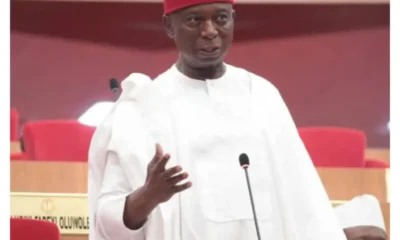

Gov Oborevwori afraid of ‘Anioma State’ — Ned Nwoko


AFDB REAFFIRMS $2.2 BILLION PLEDGE AS VP SHETTIMA COMMISSIONS 2ND SAPZ IN CROSS RIVER ** Says agro-industrial processing zones will empower farmers, attract investors, diversify Nigeria’s economy
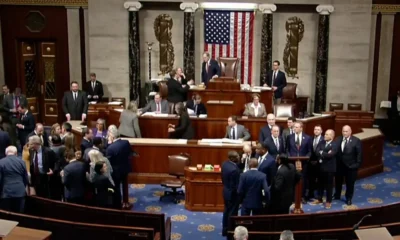

US Reps passes Trump-backed bill to cut govt taxes, spending


Nigerians to start enjoying benefits of lower global crude prices — PETROAN


Owerri correctional facility dispels rumours of attack, jail break


Regina Daniels Enjoys Quality Time with Nollywood Legend Osita Iheme on Set
Politics
Gov Oborevwori afraid of ‘Anioma State’ — Ned Nwoko
Published
49 minutes agoon
April 10, 2025By
Ekwutos Blog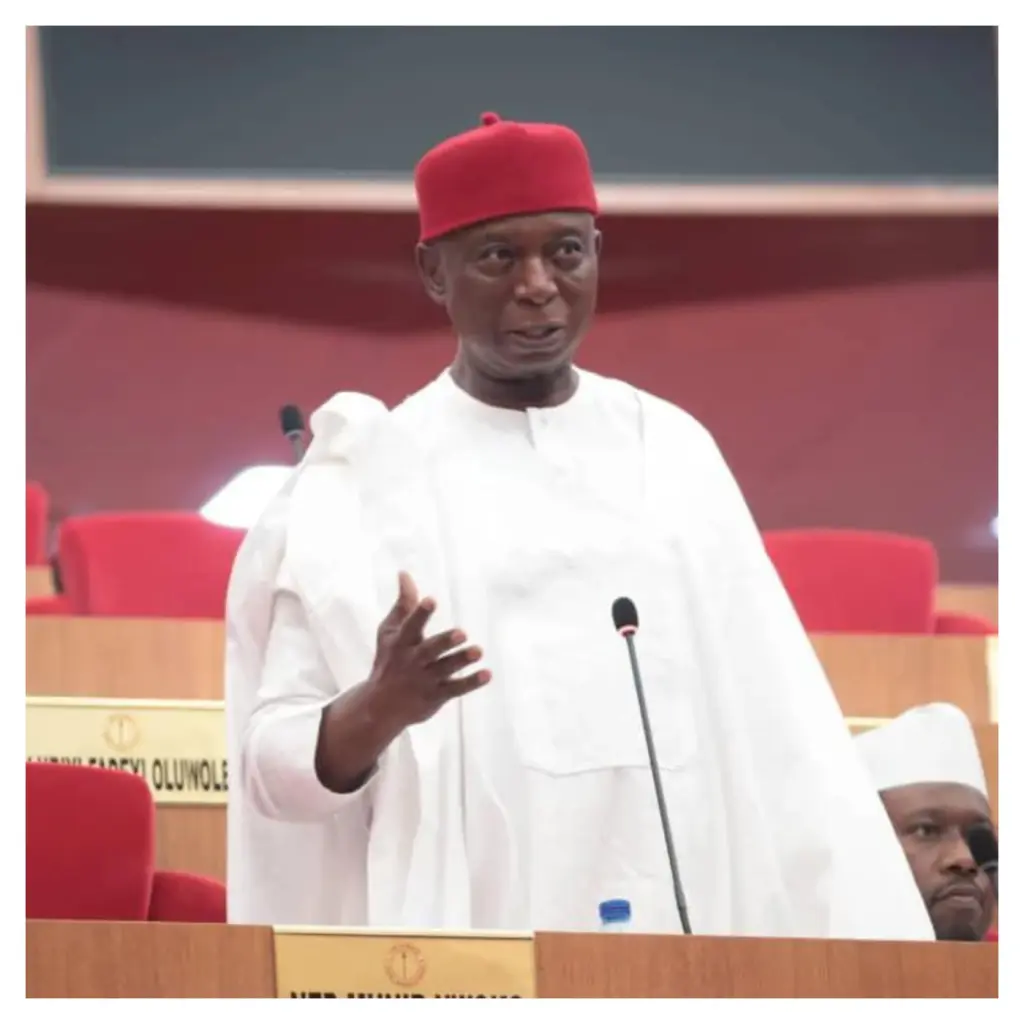
The senator representing Delta North Senatorial District, Ned Nwoko, has disclosed that Governor Sheriff Oborevwori does not understand the benefits of state creation.
He revealed this in Ogwashi-Uku, Oshimili North Local Government Area on Thursday during the APC Women Support Group in collaboration with Rita Daniels Single Parenthood, Girl Child Initiative, and Regina Daniel’s Charity and Development Foundation.
He also confirmed that Governor Oborevwori warned his aides against the projects, turning them into opponents of Anioma State creation, fearing the creation of another state for selfish interests.
The senator, who said the governor told him he would not support the creation of Anioma State, vowed that nothing would stop the creation of Anioma State, not even the governor.
“It is now at public hearing after passing the 2nd reading; then it will be back to the Senate for the 3rd reading and will eventually go to the President for assent.
“From the Delta North first Senator Osakwe, through Nwaoboshi, Okowa, they were all afraid because they don’t want the state to be shared. They don’t know the advantages of state creation, such as two governors, two deputies, more lawmakers, and other developments.
“The only party that will make it happen is APC. If there is anybody in other political parties, it is because of their stomachs, but not for the interest of Anioma people,” he said.
On why he joined APC, Nwoko said he had a meeting on 1st January 2025 with President Tinubu, had meetings with the Senate President and other APC leaders and stakeholders subsequently, who told him that Anioma State creation could only be their project if he joined APC.
“If I am pushing and I have the President with me, wouldn’t I need to join APC? They said it was my project since I was in PDP, but if I wanted it to be their project, I should join APC. I want it to be their project. All APC members on the committee I belong to support Anioma state creation,” the senator stated.
Politics
US Reps passes Trump-backed bill to cut govt taxes, spending
Published
2 hours agoon
April 10, 2025By
Ekwutos Blog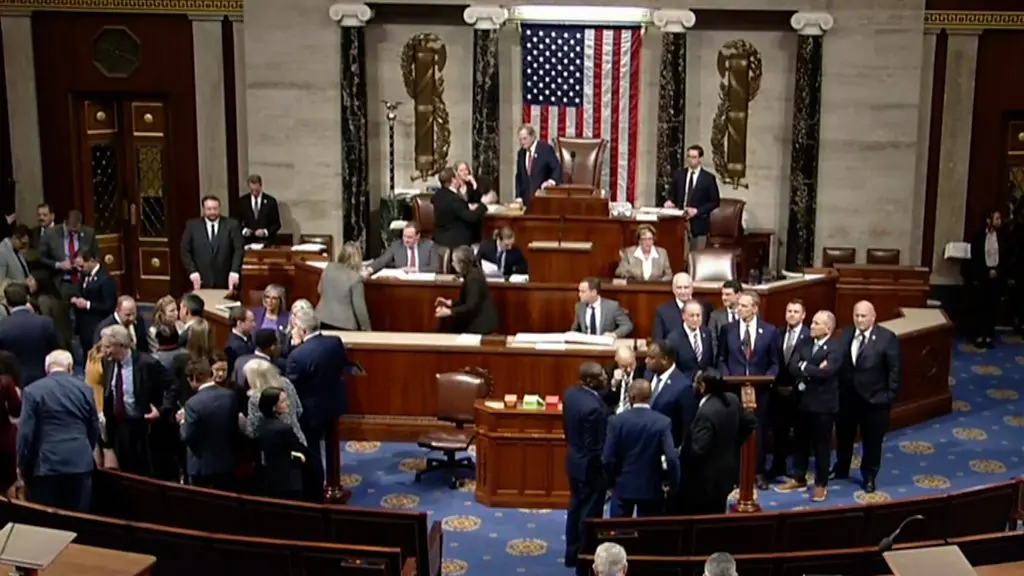
The United States, US, House of Representatives on Thursday passed a budget bill to cut government taxes and government spendings.
The bill was passed despite opposition from Democrats and Republican hard-liners.
BBC reports that the spending plan is key in President Donald Trump’s legislative agenda and he has called it a “big, beautiful bill”.
The bill was passed after 216-214 vote by lawmakers.
Reacting, Trump congratulated lawmakers for the p[assage of the bill.
Posting on social media, Trump wrote: “Congratulations to the House on the passage of a Bill that sets the stage for one of the Greatest and Most Important Signings in the History of our Country.”
However, the House bill has much deeper spending cuts than the version passed by the US Senate, and the two versions must now be merged into one bill for him to sign into law.
The House passed the budget bill mostly along party lines, with all Democrats voting against, along with two Republicans – Thomas Massie of Kentucky and Victoria Spartz of Indiana.
Politics
Presidency unveils committee to trickle down federal policies to community dwellers
Published
3 hours agoon
April 10, 2025By
Ekwutos Blog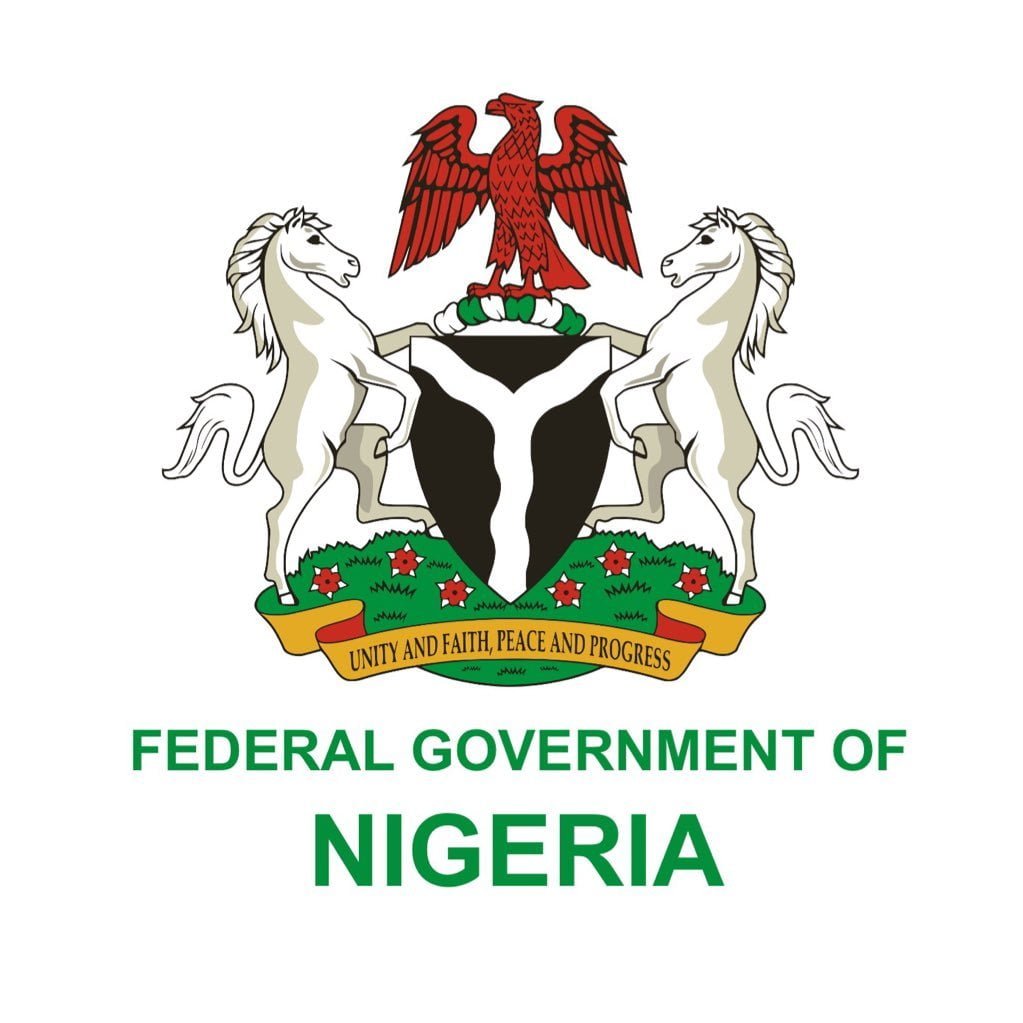
The Presidency on Thursday, took steps to close the gaps in bringing federal policies closer to grassroots communities across Nigeria, with the inauguration of a National Community Engagement Framework Drafting Committee.
After the ceremony held at the State House, Abuja, Senior Special Assistant to the President on Community Engagement (North‑West), Abdullahi Yakasai, said the framework will embody the spirit of partnership and collective action.
Yakasai said, “The framework drafting committee we are launching today embodies the spirit of partnership and collective action, ensuring that progress is shared responsibility.
“Our nation is at an important juncture where every decision must prioritise the wellbeing of our citizens.
“First, you will dialogue and have a meaningful conversation and action. It will present a new chapter in our nation’s history that is built on the principles of inclusivity and equity.”
Senior Special Assistant to the President on Community Engagement North‑Central, Mrs Abiodun Essiet, said the framework would serve as a blueprint for action to ensure that no citizen feels excluded from national decision‑making.
“Today is not just a ceremony; it is a call to serve, to innovate, and to rise to the occasion,” she told committee members and invited dignitaries.
“This framework reflects our collective commitment to make sure no voice is left unheard, no community left behind, and every citizen feels seen, valued, and empowered.”
Essiet urged members drawn from government, civil society, and the private sector to act as “bridges between policy and people,” stressing that their task goes beyond representation to inspiring trust and driving impact.
Under the directive of President Bola Tinubu, the committee will draft guidelines for collaborative governance, inclusive decision‑making, and citizen empowerment, she explained.
Once completed, the framework is expected to formalise channels for regular dialogue between federal agencies and local communities, with the aim of improving service delivery and boosting public confidence in government programmes.
Its first assignments include mapping existing community engagement efforts, identifying gaps, and proposing clear metrics for measuring impact.
Essiet further said the committee would work “with courage, commitment, and clarity of purpose” to deliver results swiftly.
“Nigeria is counting on us. Let us rise to the call,” she concluded.
The State House Permanent Secretary, Temitope Fashedemi, emphasised the importance of the committee’s successful assignment and its impact on communities nationwide.
Represented by the Director, Information and Communication Technology, Lukman Kilani, Fashedemi assured the committee of support to ensure a successful assignment that will positively impact the communities across the country.
A consultant on the project, the CEO at Environmental Harmony Limited, Mrs Kitan Oluwagbuyi, apprised committee members of the task ahead.
Oluwagbuyi said the committee has six weeks to draft the framework.
She explained that the framework is meant to “Provide a structured approach to stakeholder identification, mapping, and engagement.
“Create tools and templates for participatory governance at all levels. Strengthen feedback mechanisms to improve policy implementation and service delivery.
“Enhance government accountability and transparency in community-driven development programmes.”
According to Oluwagbuyi, the opening fortnight will be devoted to stock‑taking.
During this period the framework drafting committee is expected to present a detailed status report, distilling lessons from earlier outreach programmes, while other committee members will lay out their engagement strategies, successes and persistent bottlenecks.
By the third and fourth weeks, external consultants will have drafted the first version of the National Stakeholders’ Engagement Framework and circulated it for line‑by‑line scrutiny by all members.
The final stretch, covering weeks five and six, will see the committee fold comments into a clean text, vote to adopt the document and forward it to the Federal Government for approval and nationwide implementation.
The stakeholders received goodwill messages from the President of the Community Development Practitioners of Nigeria, Prof. Bello Shittu; Professor of Public Policy, Governance and Core Government Functionality at the University of Abuja, Prof. Abdulhamid Ozohu-Suleiman and the Sarkin Bwari, Auwal Musa Ijakolo II.

Gov Oborevwori afraid of ‘Anioma State’ — Ned Nwoko

AFDB REAFFIRMS $2.2 BILLION PLEDGE AS VP SHETTIMA COMMISSIONS 2ND SAPZ IN CROSS RIVER ** Says agro-industrial processing zones will empower farmers, attract investors, diversify Nigeria’s economy

US Reps passes Trump-backed bill to cut govt taxes, spending
Trending

 Trending6 months ago
Trending6 months agoNYA demands release of ‘abducted’ Imo chairman, preaches good governance
- Business6 months ago
US court acquits Air Peace boss, slams Mayfield $4000 fine

 Politics6 months ago
Politics6 months agoMexico’s new president causes concern just weeks before the US elections
- Entertainment6 months ago
Bobrisky transferred from Immigration to FCID, spends night behind bars
- Entertainment6 months ago
Bobrisky falls ill in police custody, rushed to hospital

 Politics6 months ago
Politics6 months agoRussia bans imports of agro-products from Kazakhstan after refusal to join BRICS

 Politics6 months ago
Politics6 months agoPutin invites 20 world leaders
- Politics1 year ago
Nigerian Senate passes Bill seeking the establishment of the South East Development Commission.

